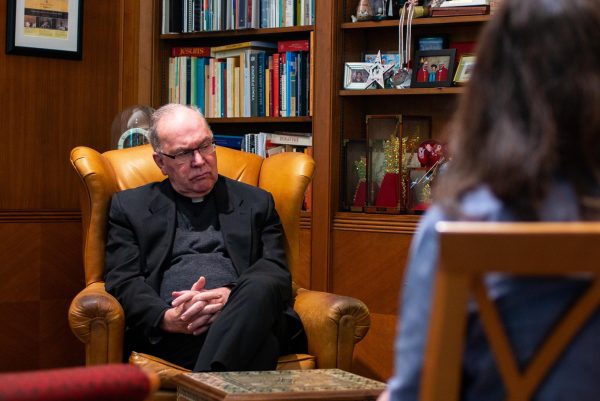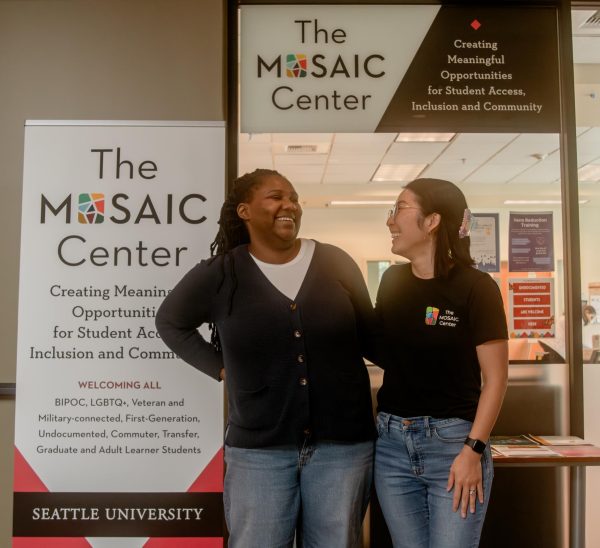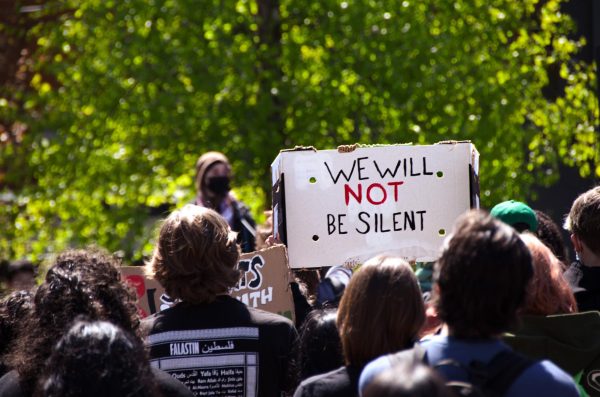Four Weeks Into Winter Quarter, Seattle U Students Reflect on 46th Presidential Election
Former president of the United States Donald Trump left the White House for the very last time to be remembered as the first president to be impeached twice—all amid an ongoing global pandemic, concerns over election legitimacy and a multitude of other political divisions that have taken the nation by storm. Jan. 20 marked Joe Biden’s inauguration as the 46th president of the United States.
To start the 59th Inauguration Day ceremony, Fr. Leo O’Donovan led the invocation. Lady Gaga then performed the National Anthem and firefighter Andrea Hall led the audience in the Pledge of Allegiance, performing it orally and in sign language. To follow, Madame Vice President Kamala Harris took to the stage to begin her inaugural process.
Awaiting the inauguration of Joe Biden, Jennifer Lopez sang “This Land is Your Land” and “America the Beautiful.” Many women, including Lopez, wore colors symbolic to the suffrage movement of the early 20th century. Additionally, the purple colors that Vice President Harris, Hilary Clinton, Michele Obama and a few others wore signaled unity for America as it mixed the traditional Republican and Democratic colors of red and blue together. In an interview with USA Today, Clinton expressed her reasoning behind wearing purple.
“I did wear purple with a purpose, because I knew the theme that President Biden was striking was unity. I thought, as you combine red and blue, the way that we are divided politically in our country, you get purple,” Clinton said. “I wanted just to send a bit of a symbolic message that we need to come together.”
Just before noon EST, Joe Biden was inaugurated as president of the U.S. Following his swear in, Biden addressed the public audience and viewers tuning in from their homes. In his inaugural address, he called for unity across the country and promised that he would represent not only his supporters, but those that did not vote for him—as well as anyone somewhere in between. The full address can be found here.
Not only did Biden call for unity in his speech, but the nation’s first-ever youth poet laureate, 22-year-old Amanda Gorman, also took the stage to recite one of her own poems. In it, she offered hope and brought up the need for rebuilding the nation as one. In an interview with CNN, Gorman elaborated on the purpose of her poem being the power of words.
“We’ve seen over the past few years the way in which the power of words has been violated and misappropriated,” Gorman said. “And what I wanted to do was kind of reclaim poetry as that site in which we can re-purify, re-sanctify—not only the Capitol building that we saw violated, but the power of words—and invest that in kind of the highest office of the land.”
Third-year strategic communications student Morgan Young writes poetry herself, and felt a connection with Gorman when she listened to her speak on Inauguration Day. Similar in age to Gorman, Young was even more inspired by the power Gorman had speaking on such an important day for the country.
“I was very inspired by Amanda’s poem for the reason that I recognized my voice in hers. The way she articulated her emotion and the glimmer of hope that our people, and Americans in general, still have,” Young said. “Her poem inspired me to continue to write. At such a young age, she was able to move America with her words, and that gives me hope that I will be able to have that same affect.”
Nate Shani, a third-year sociology major, recently participated in the Racial Justice and Poetry event at Seattle University Jan. 21. As another student interested in poetry, he admired Gorman’s poem at the inauguration.
“After relistening to her poem, I am in awe of how beautiful this poem is. The way she reads it is amazing,” Shani said.
Biden has been in office for about a week and has already signed several executive orders, including a mask mandate to help slow the spread of COVID-19. Biden also promised to reverse decisions Trump made in his campaign, taking the first step in doing so by rejoining the Paris Agreement his first day in office.
Second-year History and International Studies student Julia James shared her opinion on Biden’s first few days as president.
“Biden is handling his position well, given he took immediate action on pressing issues the day he was sworn into office, such as revoking the permit of the Keystone pipeline,” James said. “I hope that a reversal of many of Trump’s harmful actions will be executed during Biden’s presidency, as well as mending our foreign relationships.”
Only two weeks after the insurrection at the Capitol Jan. 6, U.S. Capitol Police Officer Eugene Goodman escorted Vice President Harris down the steps following the ceremony. After facing a crowd of Trump supporters alone on the stairs leading to the Senate chambers, Goodman was offered a new role. He accepted and is now the acting deputy Senate sergeant-at-arms. This moment of the inauguration honored the work he had done two weeks prior, in what is believed to be a time during which he saved the members of the Senate’s lives.
Additionally, Biden has made efforts to diversify the roles within the White House and other top political positions. This included Lloyd Austin, who will lead the Department of Defense in the Biden Administration as the nation’s first Black defense secretary. Biden also nominated Dr. Rachel Levine to serve as assistant health secretary. This would make her the first openly transgender official to be confirmed by the U.S. Senate.
Sophia Annest, third-year political science and strategic communications student, hopes Biden’s presidency will bring the U.S. respect and progress. So far, Biden has made decisions that line up with Annest’s wishes—but she is weary it may not last.
“There are so many changes I would like to see, but I do not want to be overly ambitious. Currently, having a competent leader to manage the pandemic is the most salient issue. Over the next four years, I hope President Biden will address racial injustice, climate change, healthcare and education,” Annest said.
As the Political Science Club President, Annest also emphasized the importance of a peaceful transition of power. The club did not host an event on the topic of the inauguration, but did have their weekly meeting on Inauguration Day.
“Having a peaceful transfer of power between political parties is crucial to the maintenance of a democracy,” Annest said. “Despite Trump’s attempt to stop the transition of power, he was unable to completely strip our democracy of its core functions.”
After four years of presidency under Trump, a new president now sits in the oval office. Biden has set forth plans for his first 100 days in office, working to unify the United States.











